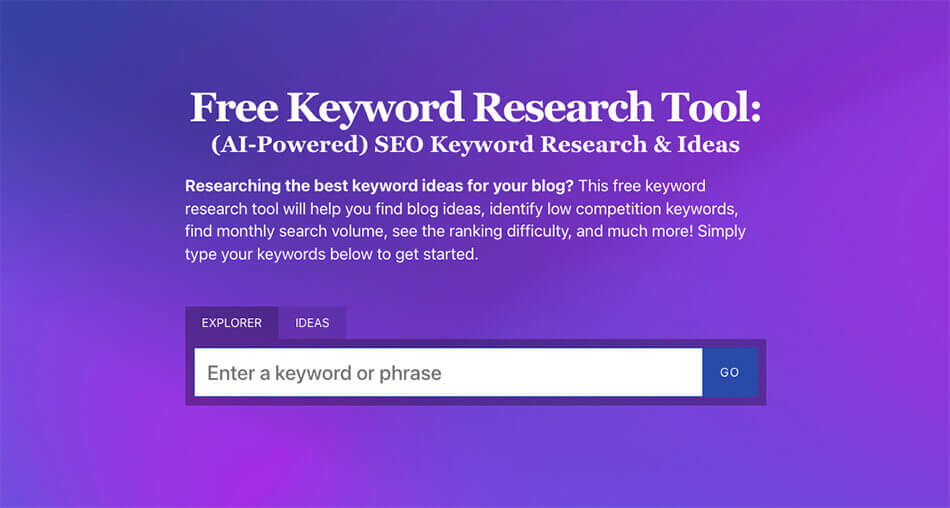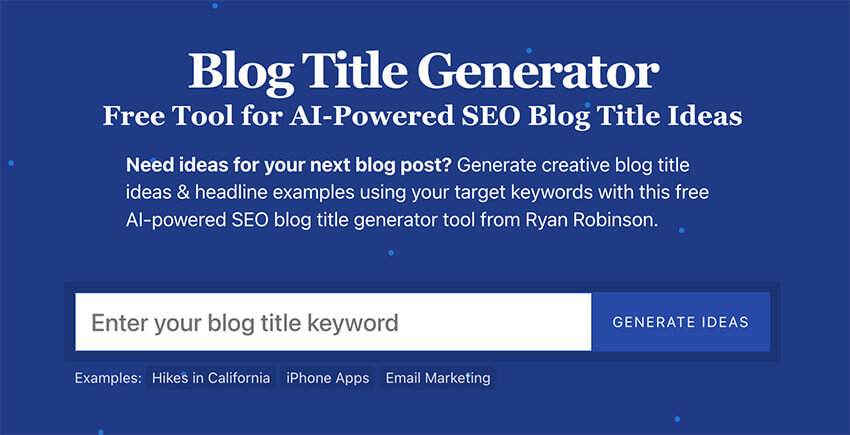You want to be a successful blogger, but right now, you don’t have much money to spare. Enter: today’s roundup of the best free blogging resources to grow your blog quicker.
Whenever you look at your email marketing, another well-known blogger promotes an expensive course.
Many free resources disappoint you. Perhaps you attended a “free” webinar only to find it’s a half-hour of fundamental tips followed by a massive sales pitch.
Do you need to spend a fortune to get the information you need? No. Absolutely not.
Yes, many great paid resources can help you on your blogging journey—but when you’re just getting started, there are tons of excellent free resources you can utilize as well. If you want even more, check out my list of top blogging courses and blogger books—some of which are paid, though they’re all great value for what they offer.
Just remember: your time is valuable, too. You want the best free blogging resources you can find. You don’t want to waste your time on hastily thrown-together PDFs.
20 Best Free Blogging Resources (for All Bloggers) in 2024
- How to Build a (Profitable) Blog in 7 Days
- Free Keyword Research Tool by Ryan Robinson
- AI-Powered Blog Title Generator Tool (Blog Topic Ideas)
- WordPress Training Course: Learn How to Build a WordPress Website Using Elementor
- WPBeginner’s WordPress 101 Video Tutorial
- What is Social?
- The Beginner’s Guide to Branding
- Free 5-Day Traffic & Monetization Mini Challenge
- The Complete Collection of Content Creation Templates
- The SEO Bootcamp (Stupid Simple SEO)
- Free Graphic Design Training
- 10-Step Copywriting Framework
- Content Audit Template
- SEO Unlocked
- Free Weekly Newsletter Planner
- How to Build a (Profitable) Blog in 7 Days
- Blog Business Plan Template
- Blog Planner Bundle
- 3 Free Blogging Books
- 10 Free Blog Post Templates
Disclosure: Please note that some of the links below are affiliate links and at no additional cost to you, I’ll earn a commission. Know that I only recommend products and services I’ve personally used and stand behind. When you use one of my affiliate links, the company compensates me, which helps me run this blog and keep my in-depth content free of charge for readers (like you).
Here are a collection of my favorite free blogging resources. If you want more, check out my list of top blogging courses and blogger books—many of which are paid, though they’re all great value for what they offer.
Note: For many of these resources, you’ll need to sign up using your email address to gain access (you’ll likely be added to an email list for marketing purposes).
Beginner Bloggers: Resources for Launching Your Blog
If you haven’t yet launched your blog, or if you’ve had a go at blogging in the past but didn’t get very far, these are the resources you need to get off to a fantastic start.
1. How to Build a (Profitable) Blog in 7 Days
Format: Text (delivered via email)
Structure: 6 lessons
This course teaches you my step-by-step process for setting up your blog in just minutes.
It also teaches you how to create high-quality content that attracts thousands of readers. We cover effective ways to monetize your blog as well so you can make real money blogging.
You can work through the course daily — but if you want to go faster, there’s a link in each email to advance straight to the next lesson.
2. Free Keyword Research Tool by Ryan Robinson
Format: Free Tool
Structure: Type in your keyword phrase and get monthly search volume, difficulty & suggestions for other keyword phrases to target for your blog content
I built this free AI-Powered Keyword Tool to solve a problem I’ve had in the blogging industry for nearly a decade. Anytime a new (free) keyword research tool comes out and gains popularity, a switch flips, and it’s suddenly only a paid tool—or has dramatic limitations on usage. This keyword research tool was built to be forever free.
When you type in a keyword you’re considering blogging about, you’ll get dozens of research-backed ideas for keywords & topics to write about on your blog today. You’ll get insights like:
- Monthly Search Volume: A snapshot of how many people search for a particular keyword phrase monthly on significant search engines like Google.
- Difficulty Level: How hard it’ll be to rank for a particular keyword phrase based on the amount of existing (and anticipated future) competition from established websites.
- Country Targeting: The default country view is for the US (United States). However, you can select other countries from a dropdown menu to see what regional search volume & difficulty look like for your target keyword phrases.
- Ideas: Use the ideas tab (or click the lightbulb) to get dozens of AI-powered blog topic ideas related to the keyword you’ve chosen.
3. AI-Powered Blog Title Generator Tool (Blog Topic Ideas)
Format: Free Tool
Structure: Input your keyword phrase and get dozens of AI-powered blog titles & topic ideas
I built this free AI-Powered Blog Title Generator Tool to help my readers develop unique, research-backed blog post ideas to write about.
When you type in a keyword phrase, you’ll instantly get dozens of SEO-friendly headline ideas to inspire your blogging efforts (and make your headlines stand out against the competition).
4. WordPress Training Course: Learn How to Build a WordPress Website Using Elementor (Simon Shocket)
Format: Video
Structure: 3 lessons, split into 17 videos (1 hr 11 mins total)
I love WordPress: it’s the blogging platform I always recommend using. But I know WordPress can feel like a steep learning curve when you’re just getting started.
This detailed, free training course from HubSpot takes you through everything you need to know, from setting up your website (including getting a domain name and web hosting), understanding how WordPress works, installing WordPress plugins and WordPress themes, and using the popular page builder Elementor.
5. WPBeginner’s WordPress 101 Video Tutorials (Syed Balkhi)
Format: Video
Structure: 34 separate videos, each around 2–7 minutes long
These videos, created by Syed Balkhi and his team at WPBeginner, are a fantastic introduction to everything you’ll want to know in your early days of blogging, including WordPress.com vs WordPress.org, using the block editor, creating and editing posts, adding images, installing and customizing themes, enabling and managing comments, and much more. Side note: I recommend using Grammarly in your Google Docs to help as an extra set of proofreading eyes.
As Syed puts it, “I am tired of self-proclaimed ‘blogging experts’ charging hundreds of dollars to teach how to use WordPress. I believe basic education like this should be FREE.”
6. What is Social? (Randy Hlavac)
Format: Video and text
Structure: Four weeks, including videos, readings, and peer-graded assignments
In instructor Randy Hlavac’s words, this Northwestern University course is designed to “give you an overview of social and the important ways you need to view social to build successful marketing strategies.”
The videos include full transcripts, not just in English but also in a range of other languages. The course is designed to take four weeks, though you can go faster or slower if you want to.
The course is designed to give you a big-picture overview of the social media landscape. It also includes specific tips for creating your own content strategy, designing social communities, and positioning yourself as a brand authority. It touches on using tools like Canva to create social images.
There are quizzes and assignments to help you consolidate what you’ve learned.
Tip: Don’t click the “free trial” button when you sign up. You want the “audit the course” link to get the course for free for as long as you want it.
7. The Beginner’s Guide to Branding (Laura Busche)
Format: PDF ebook
Structure: 6 short chapters
This 35-page ebook covers all the basics of branding, explaining what branding means and going through all the basics, like what name to choose, how to craft your brand identity, and how to create style guidelines.
You’ll get tips on choosing colors that work well together and picking the suitable typeface for your blog.
The ebook also explains some key pitfalls people face with branding and how to avoid them.
As the author, Laura Busche, explains, “Branding is not just about fancy graphics on your landing page. A strong brand, or lack thereof, could make or break you.”
More Experienced Bloggers: Resources for Your First Year of Blogging
Once your blog is up and running, you’ll still want to keep learning. During your first year, you will likely focus on creating regular content, growing your traffic, and getting ready to make money from your blog.
8. Free 5-Day Mini Challenge for Traffic & Monetization (Lena Gott)
Format: Text-based online course
Structure: 5 separate days of lessons plus homework
This free challenge takes you through key ways to get more traffic and make money from your blog.
It covers simplifying your strategy, implementing income pathways on your blog, crafting strong calls to action, finding hidden niches other bloggers aren’t targeting, the importance of your conversion rate, and more.
The course is text-based, with less than 15 minutes of reading each day — though you’ll need to allow time to put what you’re learning into practice, too, with the homework tasks.
As soon as you sign up, you get access to the whole course, so you can tackle multiple days at once or go through it more slowly.
9. The Complete Collection: Content Creation Templates (HubSpot)
Format: Google documents, spreadsheets, and slides
Structure: Multiple separate sets of templates
This mammoth collection of templates includes every type of template you’re likely to need for your blog: blog post templates, buyer persona templates, ebook templates, infographic templates, PowerPoint templates, and much more.
There’s also an editorial calendar and social media calendar to help you plan your content. You can save all the files to your computer or access them in Google Drive.
10. The SEO Bootcamp (Stupid Simple SEO) (Mike Pearson)
Format: Video
Structure: 5 separate videos,
This series of five videos explains how to scale your traffic and income, covering topics like domain authority, keyword research, relevancy, and creating content that ranks.
It’s a beginner-friendly SEO course that covers everything you need to know and understand about search engine optimization. Each video is 7–12 minutes long.
11. Free Graphic Design Training (Kristin Rappaport)
Format: Video (via Teachable)
Structure: Several course sections, each split into short (1–2 minute) videos
This detailed course from Kristin Rappaport covers basic design principles, including proximity, alignment, repetition, contrast, and hierarchy, before tackling some common graphic design mistakes to avoid—like bad color choices, hard-to-read text, and adding unnecessary elements.
You’ll get 30 different graphic design tips in under 30 minutes, all delivered in a simple, beginner-friendly way.
Even if you’re using pre-made templates for your graphics and content, it’s still really helpful to learn graphic design basics.
Advanced Bloggers: Free Blogging Resources to Take Your Established Blog Further
Ready to take your blog to the next level?
If you’ve been blogging for months or years, you may already have all the best blogging tools. Perhaps you feel there’s not too much left to learn. But all these blog resources can help you hone your skills — and make more money.
12. 10-Step Copywriting Framework (Arman Assadi)
Format: Webinar (on-demand)
Structure: Video webinar
This free masterclass takes you through writing persuasive copy (without sounding “salesy” or full of hype) and making your copy more engaging, personal, and entertaining. You’ll learn to write copy quickly — even if you’re a beginner.
After signing up, note that you need to wait about 9 minutes to view the webinar, during which time you can watch an introduction video from Arman Assadi.
One drawback to this resource is that there aren’t any controls to pause, speed up, or slow down the webinar recording, so you’ll want to set aside about an hour and a half to watch it.
13. BabelQuest: Content Audit Template
Format: Excel spreadsheet
Structure: Spreadsheet plus link to instructions
Although this is a small free resource, it’s really useful if you’re revamping a blog that already has a lot of content—or even if you’ve purchased or taken over someone else’s blog.
It’s designed to help you audit your existing content, identify potential content gaps, and list the changes and updates you want to make.
14. SEO Unlocked (Neil Patel)
Format: Video
Structure: Seven weeks, split into short 10 – 20 minute videos
This detailed SEO course from online marketing guru Neil Patel takes you through all the basics of SEO, then digs deep into keyword research, on-page and technical SEO, content marketing, link building, and more.
Toward the end of the course, you’ll also get tips on user engagement and conversion optimization.
SEO Unlocked also gives detailed instructions on setting up Google Analytics and Google Search Console.
There’s a lot of content here — but you can work through it all at your own pace. Although the course is designed to take seven weeks, nothing stops you from taking longer (or getting through it faster).
15. Free Weekly Newsletter Planner (Kate Doster)
Format: Planner with prompts (PDF)
Structure: 24 months with four prompts for each, plus a few bonus prompts.
Struggling to come up with ideas for your newsletter list? This free weekly newsletter planner has four monthly prompts (plus four bonus prompts each year for months when you must send five newsletters).
It’s designed so you can print it out and fill in the monthly calendar, though if you want the prompts, this does take up quite a bit of space.
There’s at least one “MM” (money maker) prompt each month designed for you to promote one of your products/services or something from an affiliate. Most of the ideas will work for any blogging niche.
Bonus: 5 Can’t-Miss Blogging Resources Here on ryrob.com
The 12 resources above are my favorite picks from other top-notch bloggers worldwide. But I’d be remiss not also to share my resources.
I’ve created many freebies based on what RyRob readers want most. You don’t have to pay a cent for these—they’re all completely free to download.
16. How to Build a (Profitable) Blog in 7 Days
Format: Text (delivered via email)
Structure: 6 lessons
This course teaches you my step-by-step process for setting up your blog in just minutes.
It also teaches you how to create high-quality content that attracts thousands of readers. We cover effective ways to monetize your blog as well so you can make real money blogging.
You can work through the course daily — but if you want to go faster, there’s a link in each email to advance straight to the next lesson.
17. Blog Business Plan Template
Format: Google Doc (you can also download it as a Word document or PDF)
Structure: 6 sections, each with multiple questions and space to type your answers
My blog has been earning well over six figures for years. My business plan kept me on track during the years I built my blog. My free business plan template guides you through everything you need to figure out to build a successful blog.
That includes uncovering your reasons for blogging, setting goals, positioning and branding your blog, understanding your audience, doing a competitive analysis of other blogs, and much more.
18. Blog Planner Bundle
Format: PDFs and Google Docs
Structure: Multiple separate resources
This isn’t just one resource — it’s a whole bundle of resources to help you grow your blog. These include:
- 200+ blog post ideas to help inspire you
- A one-page keyword research checklist to keep you on track when you’re coming up with keywords
- A template for outlining and writing blog posts
- A one-page SEO checklist to make sure your posts match up to best practices
- A printable that you can use to create your weekly blogging to-do list
- A one-page content promotion checklist for helping your posts get more traffic
- An editorial calendar template to organize what you’re publishing on different dates
If you’re fitting your blogging around a day job, kids, or other big responsibilities, you need these resources. They’ll help you stay on track regardless of how busy things get.
19. 3 Free Blogging Books
Format: PDFs
Structure: 3 separate books totaling 311 pages
Want to dig deep into the world of blogging? I’ve got three completely free books for you. They’re an excellent read for new bloggers, but you’ll also learn a lot, even if you’ve been blogging for a while. They are:
- How to Start a Successful Blog This Year—This eBook covers choosing your blog’s name, getting it online, designing it, writing your first post, making money, and much more. I also cover some frequently asked questions about blogging, covering things like how to stand out in a crowded niche, how much it costs to start a blog, and more.
- How to Promote Your Blog This Year — this eBook teaches you the basics of SEO (search engine optimization), how to research your competition, how to promote your blog to your target audience, how to grow your social media presence, how to connect with influencers in your niche and more.
- How to Make Money Blogging This Year — this eBook covers proven ways to make money blogging, including sponsored content, affiliate marketing, running ads, selling online courses, selling physical products, selling your services, and more. If you’re wondering how much bloggers make—and want your blog to bring in a consistent income for you, too, then these methods are all hugely effective.
20. 10 Free Blog Post Templates
Format: Google Doc
Structure: Filled-out examples, then blank templates you can complete
This free blog post template has an SEO brief to fill out and an outline for your blog post.
It includes many tips to help you craft a great blog post, from having an introduction that hooks the reader to splitting your blog post into critical sections that deliver real value for your reader.
Ready to Dig Into Some Amazing Free Blogging Resources?
Whew! There are a lot of fantastic blogging resources on this list … all completely free of charge. If you work through all of these, you’ll know more than many people who’ve been blogging for months or years.
If you’re feeling slightly overwhelmed, here’s what to do.
First, sign up for my free course, How to Build a (Profitable) Blog in 7 Days. You’ll get each lesson straight to your inbox, so following the course is easy.
I’d recommend tagging the emails or saving them in a particular folder so you can easily refer back to them if you want to.
Once you’ve completed that course, you should have your blog up and running. If you get stuck at any point, do check out the “Beginners” resources above for detailed help with WordPress.
Next, download my Blog Business Plan Template. You don’t need the perfect business plan from day one … but even a little planning can save you a lot of time. Have a go at coming up with a business plan for your blog.
After that, pick any resource from the list above that will help you. Try to set aside 15 minutes daily to work through it … and make sure you put what you’re learning into practice, too.
Ready to get started? Head here to sign up for How to Build a (Profitable) Blog in 7 Days.





Hi Ryan
Great resources
As a novice to blogging and approaching my 70th birthday can I become a great blogger within 6 months?
Start today
👏
Great question, Jim! I’d say having a more tangible goal of say a specific amount of monthly traffic or income would be a better target, that way you can measure your progress. Check out my guide to setting realistic blogging goals here and that’ll steer you in the right direction: https://www.ryrob.com/blogging-goals/
Thank you Ryan for this edition of “18 Best Free Blogging Resources in 2022. I have always kept you subscribed in my list of email contacts, however, financially I end up finding myself disappointed that even though as little as it sometimes costs, I still can’t afford to spend what little money I have. This time I think I can go through with committing some time and effort to get something going. Thank you this message of what I believe will help me to fulfill a desire and dream to become a successful blogger. God Bless! Sincerely, Raymond Duran, 72 years and still kicking!
You’re welcome, Raymond! Thanks for tuning in and glad to hear you got some useful tidbits here—sorry to hear your blogging journey has had some fits & starts, but I’m wishing you luck 🙏
Thank you so much for sharing dear
You’re welcome! 🙂
Shortened URLs can also be used to simplify complex URLs that may include parameters or tracking codes, making them more user-friendly.
Fantastic roundup! These resources are a game-changer for bloggers.